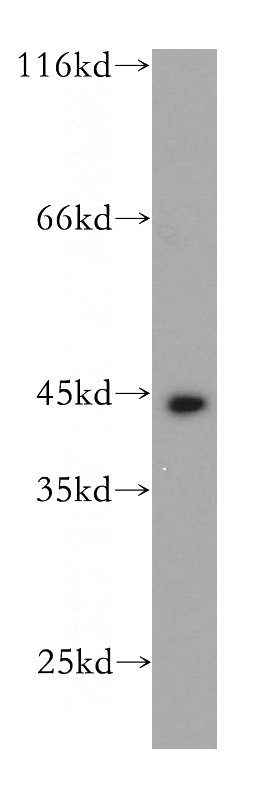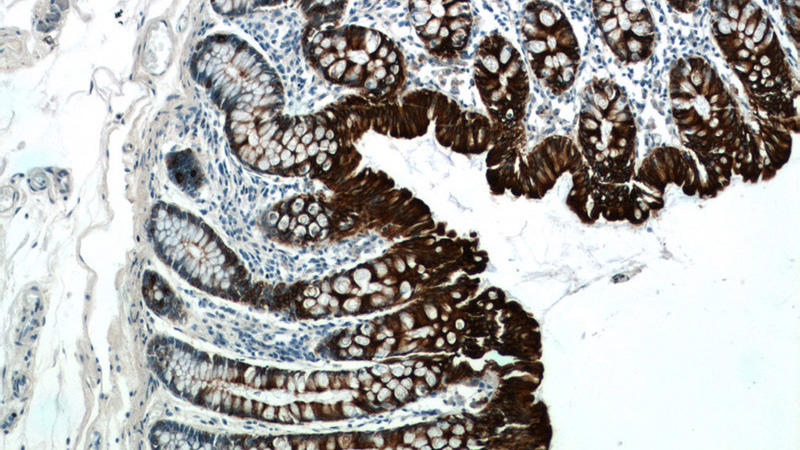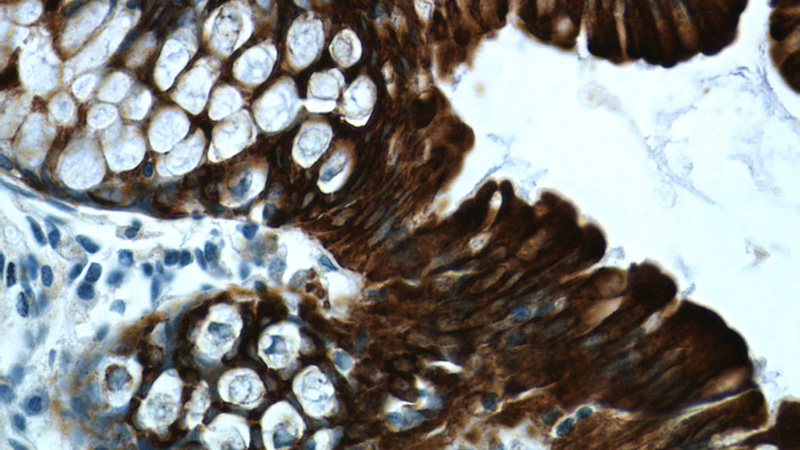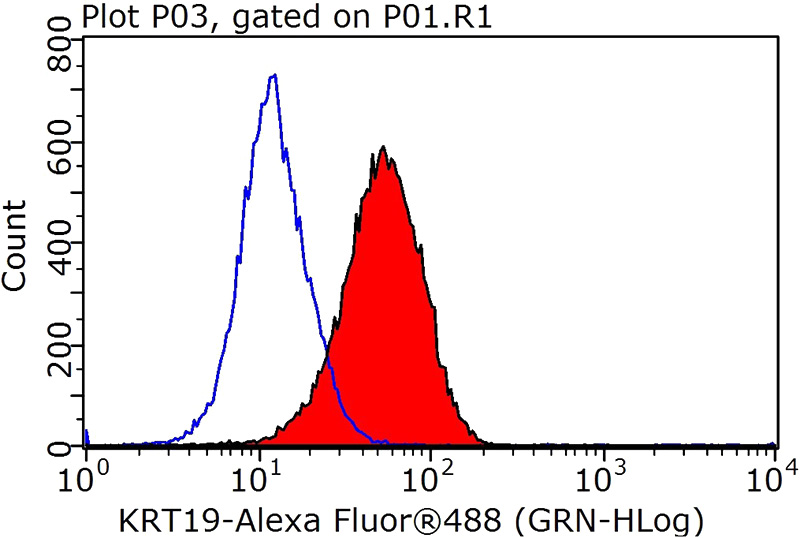-
Product Name
Cytokeratin 19 antibody
- Documents
-
Description
Cytokeratin 19 Rabbit Polyclonal antibody. Positive IHC detected in human colon tissue, human appendix tissue, human breast cancer tissue, human endometrial cancer tissue, human liver cancer tissue, human liver tissue, human lung cancer tissue, human ovary tumor tissue, human pancreas cancer tissue, human pancreas tissue, human prostate cancer tissue, human prostate hyperplasia tissue, human skin tissue, human thyroid cancer tissue. Positive FC detected in MCF-7 cells. Positive WB detected in A431 cells, A549 cells, HepG2 cells, MCF7 cells, mouse brain tissue, mouse placenta tissue. Observed molecular weight by Western-blot: 44-50 kDa
-
Tested applications
ELISA, WB, FC, IHC
-
Species reactivity
Human, Mouse; other species not tested.
-
Alternative names
CK 19 antibody; CK19 antibody; Cytokeratin 19 antibody; K19 antibody; K1CS antibody; keratin 19 antibody; KRT19 antibody
-
Isotype
Rabbit IgG
-
Preparation
This antibody was obtained by immunization of Cytokeratin 19 recombinant protein (Accession Number: NM_002276). Purification method: Antigen affinity purified.
-
Clonality
Polyclonal
-
Formulation
PBS with 0.1% sodium azide and 50% glycerol pH 7.3.
-
Storage instructions
Store at -20℃. DO NOT ALIQUOT
-
Applications
Recommended Dilution:
WB: 1:500-1:5000
IHC: 1:20-1:200
-
Validations

A431 cells were subjected to SDS PAGE followed by western blot with Catalog No:109802(KRT19 antibody) at dilution of 1:1500

Immunohistochemistry of paraffin-embedded human colon tissue slide using Catalog No:109802(CK19 Antibody) at dilution of 1:200 (under 10x lens)

Immunohistochemistry of paraffin-embedded human colon tissue slide using Catalog No:109802(CK19 Antibody) at dilution of 1:200 (under 40x lens)

1X10^6 MCF-7 cells were stained with 0.2ug CK19 antibody (Catalog No:109802, red) and control antibody (blue). Fixed with 90% MeOH blocked with 3% BSA (30 min). Alexa Fluor 488-congugated AffiniPure Goat Anti-Rabbit IgG(H+L) with dilution 1:1000.
-
Background
Keratins are a large family of proteins that form the intermediate filament cytoskeleton of epithelial cells. Keratin expression is highly regulated, tissue specific, and varies according to cell-state. Type I keratins consist of acidic, low molecular weight proteins with MW ranging from 40 kDa (KRT19) to 64 kDa (KRT9). Type 2 keratins consist of basic or neutral, high molecular weight proteins with MW from 52 kDa (KRT8) to 67 kDa (KRT18). Keratin 19 is a type I cytokeratin. It is a biochemical marker of skin stem cells in vivo and in vitro.
-
References
- Ichii H, Miki A, Yamamoto T. Characterization of pancreatic ductal cells in human islet preparations. Laboratory investigation; a journal of technical methods and pathology. 88(11):1167-77. 2008.
- Ose R, Yanagawa T, Ikeda S, Ohara O, Koga H. PCDH24-induced contact inhibition involves downregulation of beta-catenin signaling. Molecular oncology. 3(1):54-66. 2009.
- Martin-Pagola A, Sisino G, Allende G. Insulin protein and proliferation in ductal cells in the transplanted pancreas of patients with type 1 diabetes and recurrence of autoimmunity. Diabetologia. 51(10):1803-13. 2008.
- Hanley SC, Assouline-Thomas B, Makhlin J, Rosenberg L. Epidermal growth factor induces adult human islet cell dedifferentiation. The Journal of endocrinology. 211(3):231-9. 2011.
- Wang Z, Liu F, Tu W. Embryonic liver fodrin involved in hepatic stellate cell activation and formation of regenerative nodule in liver cirrhosis. Journal of cellular and molecular medicine. 16(1):118-28. 2012.
- Li XL, Dong X, Xue Y, Li CF, Gou WL, Chen Q. Increased expression levels of E-cadherin, cytokeratin 18 and 19 observed in preeclampsia were not correlated with disease severity. Placenta. 35(8):625-31. 2014.
- Tomita K, Haga H, Mizuno K. Epiregulin promotes the emergence and proliferation of adult liver progenitor cells. American journal of physiology. Gastrointestinal and liver physiology. 307(1):G50-7. 2014.
- Zhang J, Zhou S, Zhou Y. Hepatocyte growth factor gene-modified adipose-derived mesenchymal stem cells ameliorate radiation induced liver damage in a rat model. PloS one. 9(12):e114670. 2014.
Related Products / Services
Please note: All products are "FOR RESEARCH USE ONLY AND ARE NOT INTENDED FOR DIAGNOSTIC OR THERAPEUTIC USE"
